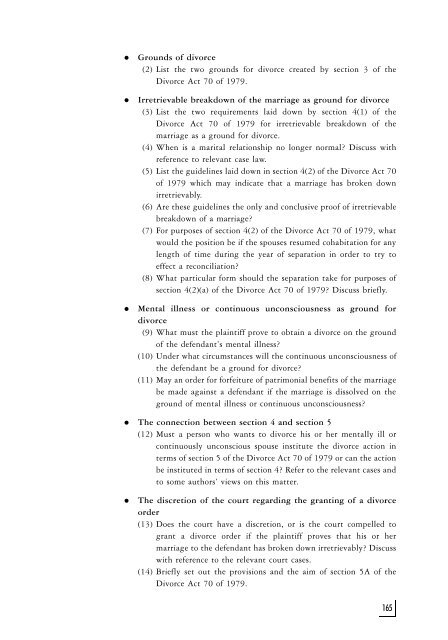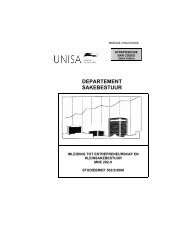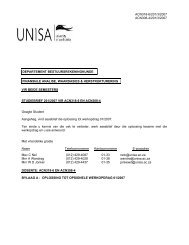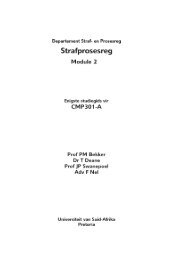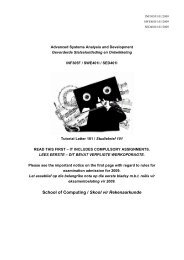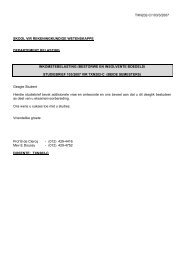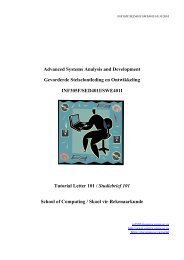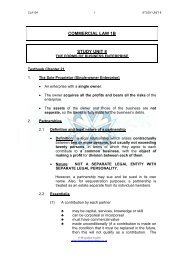key to the study guide - Name
key to the study guide - Name
key to the study guide - Name
Create successful ePaper yourself
Turn your PDF publications into a flip-book with our unique Google optimized e-Paper software.
. Grounds of divorce<br />
(2) List <strong>the</strong> two grounds for divorce created by section 3 of <strong>the</strong><br />
Divorce Act 70 of 1979.<br />
. Irretrievable breakdown of <strong>the</strong> marriage as ground for divorce<br />
(3) List <strong>the</strong> two requirements laid down by section 4(1) of <strong>the</strong><br />
Divorce Act 70 of 1979 for irretrievable breakdown of <strong>the</strong><br />
marriage as a ground for divorce.<br />
(4) When is a marital relationship no longer normal? Discuss with<br />
reference <strong>to</strong> relevant case law.<br />
(5) List <strong>the</strong> <strong>guide</strong>lines laid down in section 4(2) of <strong>the</strong> Divorce Act 70<br />
of 1979 which may indicate that a marriage has broken down<br />
irretrievably.<br />
(6) Are <strong>the</strong>se <strong>guide</strong>lines <strong>the</strong> only and conclusive proof of irretrievable<br />
breakdown of a marriage?<br />
(7) For purposes of section 4(2) of <strong>the</strong> Divorce Act 70 of 1979, what<br />
would <strong>the</strong> position be if <strong>the</strong> spouses resumed cohabitation for any<br />
length of time during <strong>the</strong> year of separation in order <strong>to</strong> try <strong>to</strong><br />
effect a reconciliation?<br />
(8) What particular form should <strong>the</strong> separation take for purposes of<br />
section 4(2)(a) of <strong>the</strong> Divorce Act 70 of 1979? Discuss briefly.<br />
. Mental illness or continuous unconsciousness as ground for<br />
divorce<br />
(9) What must <strong>the</strong> plaintiff prove <strong>to</strong> obtain a divorce on <strong>the</strong> ground<br />
of <strong>the</strong> defendant's mental illness?<br />
(10) Under what circumstances will <strong>the</strong> continuous unconsciousness of<br />
<strong>the</strong> defendant be a ground for divorce?<br />
(11) May an order for forfeiture of patrimonial benefits of <strong>the</strong> marriage<br />
be made against a defendant if <strong>the</strong> marriage is dissolved on <strong>the</strong><br />
ground of mental illness or continuous unconsciousness?<br />
. The connection between section 4 and section 5<br />
(12) Must a person who wants <strong>to</strong> divorce his or her mentally ill or<br />
continuously unconscious spouse institute <strong>the</strong> divorce action in<br />
terms of section 5 of <strong>the</strong> Divorce Act 70 of 1979 or can <strong>the</strong> action<br />
be instituted in terms of section 4? Refer <strong>to</strong> <strong>the</strong> relevant cases and<br />
<strong>to</strong> some authors' views on this matter.<br />
. The discretion of <strong>the</strong> court regarding <strong>the</strong> granting of a divorce<br />
order<br />
(13) Does <strong>the</strong> court have a discretion, or is <strong>the</strong> court compelled <strong>to</strong><br />
grant a divorce order if <strong>the</strong> plaintiff proves that his or her<br />
marriage <strong>to</strong> <strong>the</strong> defendant has broken down irretrievably? Discuss<br />
with reference <strong>to</strong> <strong>the</strong> relevant court cases.<br />
(14) Briefly set out <strong>the</strong> provisions and <strong>the</strong> aim of section 5A of <strong>the</strong><br />
Divorce Act 70 of 1979.<br />
165


